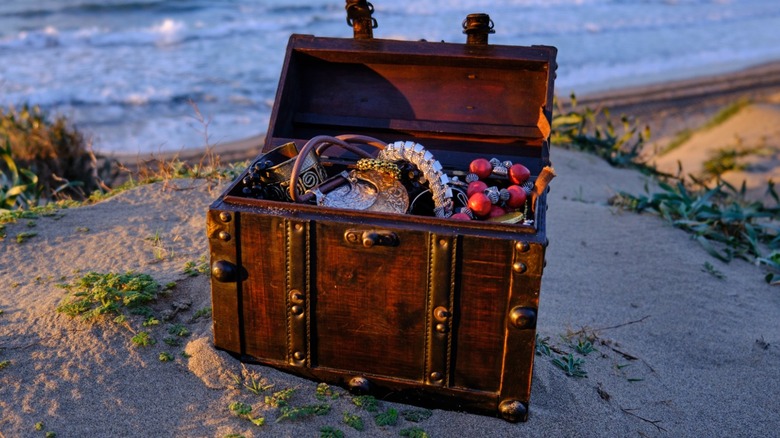The UK Government Just Decided The Fate Of Loot Boxes And It's Not What We Expected
Loot boxes, obtained through microtransactions in all-too-many games, are a controversial subject. Many game studios use them, often in excess, as a means of turning a profit. Unfortunately, the nature of loot boxes means that it's very easy to spend too much money on them — after all, you never know what you're going to get, and the games usually try to convince you to buy as many as possible. The addictive properties of loot boxes are so apparent that the U.K. House of Lords decided to take a closer look at them in 2020. After two years of deliberation, the U.K government issued a response on July 17, 2022. What's going to happen to loot boxes? The short answer: not much.
We've all heard stories about players spending hundreds, if not thousands of dollars on microtransactions in games. Loot boxes are a popular target, and they do share a lot of the same properties as plain old gambling. As the House of Lords said in its 2020 report, "If a product looks like gambling and feels like gambling, it should be regulated as gambling." With plenty of reports about young children spending insane amounts of money on microtransactions, it does seem to make sense that this should be regulated. However, the U.K. government seems to want to take a more subtle approach.
Rt. Hon. Nadine Dorries, MP, the Secretary of State of the U.K. government's Department for Digital Culture, Media, and Sport (DCMS), said in the massive report that it would be "premature to take legislative action without first pursuing enhanced industry-led measures to deliver protections for children, young people, and all players." This is unexpected, seeing as many countries are introducing some regulations to loot boxes, but the U.K. is not going to remain entirely passive on the matter.
The government expects the industry to self-regulate
In short, the government has decided to leave loot boxes unregulated for the time being, and it will not include them in the reviews of the Gambling Act. It claims that there is not enough evidence to support that buying loot boxes is a form of gambling. While the report acknowledges that it includes similar dangers, it hasn't fully determined whether there is a causative link between the two. As such, playing it safe, the government hopes that the industry will instead self-regulate.
As per the report, loot boxes should be completely unavailable to all children and young people unless enabled by a guardian. Unfortunately, this likely won't solve the problem, as kids often buy the loot boxes without their parents' knowledge. In addition, all players should be given access to spending controls and transparent information. Meanwhile, the industry is supposed to supply researchers with better access to data that could one day help in the forming of a new policy. To help propagate these rules, the U.K. Interactive Entertainment group is going to spend upwards of £1 million to increase parental and spending controls in games.
This is, of course, good news for the game studios that are responsible for the selling of these loot boxes (or other similar "random content" video game items) in various titles ranging from "FIFA 2021" to "League of Legends" and "Hearthstone." However, for the players, it's certainly a double-edged sword as oftentimes the games really don't make it easy to see just how much the person has spent until it's already too late. As a result, many companies are starting to address the problem in some ways, similar to when Google made it a requirement that game devs include loot box odds in their titles.

